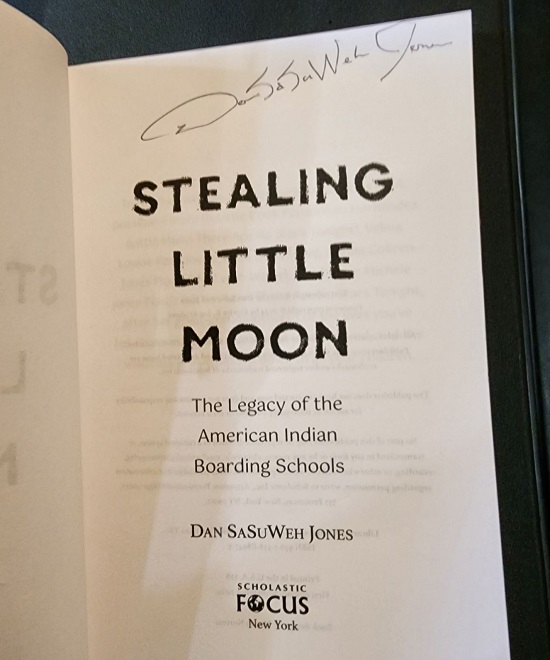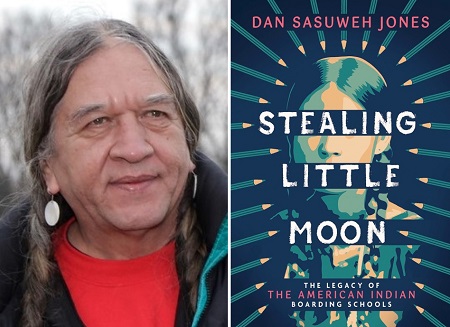
In this post, we feature author Dan SaSuWeh Jones, of the Ponca nation, whose previous titles include Living Ghosts and Mischievous Monsters: Chilling American Indian Stories, which was named to several children’s choice state reading lists, among many other honors. You can hear him speak about his new title, Stealing Little Moon: The Legacy of the American Indian Boarding Schools. You can also try his “invitation to imagine” activity and find other resources to explore. Thanks for joining us, and let us know what you think in the comments below!
Stealing Little Moon: The Legacy of the American Indian Boarding Schools
- Written by Dan SaSuWeh Jones
- Published by Scholastic Focus, and imprint of Scholastic, Inc.
- Release date: September 3, 2024
Little Moon There Are No Stars Tonight was four years old when armed federal agents showed up at her home and took her from her family. Under the authority of the government, she was sent away to a boarding school specifically created to strip her of her Ponca culture and teach her the ways of white society. Little Moon was one of thousands of Indigenous children forced to attend these schools across America and give up everything they’d ever known: family, friends, toys, clothing, food, customs, even their language. She would be the first of four generations of her family who would go to the Chilocco Indian Agricultural School. Dan SaSuWeh Jones chronicles his family’s time at Chilocco, starting with his grandmother Little Moon’s arrival when the school first opened and ending with him working on the maintenance crew when the school shut down nearly one hundred years later. Together with the voices of students from other schools, both those who died and those who survived, Dan brings to light the lasting legacy of the boarding school era. Part American history, part family history, Stealing Little Moon is a powerful look at the miseducation and the mistreatment of Indigenous kids, while celebrating their strength, resiliency, and courage—and the ultimate failure of the United States government to erase them.
“In 1884, Takare of the Wichita Indian Tribe of Oklahoma was the first child to die at Chilocco Indian Agricultural School, a place that would become intricately tied to my family.”
Explore Stealing Little Moon: The Legacy of the American Indian Boarding Schools
Listen to Dan SaSuWeh Jones talking with TeachingBooks about creating Stealing Little Moon: The Legacy of the American Indian Boarding Schools. You can click the player below or experience the recording on TeachingBooks, where you can read along as you listen, and also translate the text to another language.
- Listen to author Dan SaSuWeh Jones pronounce his name.
- Sample an e-book of Stealing Little Moon: The Legacy of the American Indian Boarding Schools on Overdrive.com.
- Sample an audiobook of Stealing Little Moon: The Legacy of the American Indian Boarding Schools on Overdrive.com.
- Explore TeachingBooks’ collection of activities and resources for Stealing Little Moon: The Legacy of the American Indian Boarding Schools.
Invitation to Imagine

TeachingBooks asks each author or illustrator on our Virtual Book Tour to share a writing prompt, a drawing exercise, or just an interesting question to spark curiosity and creativity. Enjoy the following activity contributed by Dan SaSuWeh Jones.
Imagination Activity with Dan SaSuWeh Jones
How can you get started on your own book? It’s easy when you take it step by step and break it down into small ideas, then put them back together in an outline. It’s a highly creative process that starts with thinking random, creative thoughts. Anyone can do it.
Here’s how I do it. First, I think of a book topic I’d like to write about—maybe about my family, a meaningful celebration, a day with a friend, or an experience or discovery that changed my life. For instance, with Stealing Little Moon, I started with the idea of wanting to write about my family’s experience at American Indian boarding schools.
Next, I take a blank page and put my random ideas in balloons around the page: For Stealing Little Moon, I started with: “four generations of my family,” “forced to participate,” “forbidden to speak their language,” “always hungry,” “punishments,” “acts of strength.” Then I draw arrows from those balloons to balloons with time periods. Over several weeks, even months, I might do several sheets of random ideas linked to time periods. Finally, I put all the ideas with their corresponding time periods in chronological order to make an organized outline. Then I start writing!
The fun part about my system is that I give myself plenty of time to think my random thoughts. And I can do that ANYWHERE. I can write them down while I’m sitting in a coffee shop, or shopping at the grocery store, or working on my art projects, or visiting friends. But when it comes to making the linear, organized outline, I need absolute quiet time to bring together all these creative thoughts. As I line up the random thoughts, I begin to see the connections between them and how I can turn them into a chapter, then two chapters, and finally an entire book.
Finish This Sentence . . . with Dan SaSuWeh Jones

As part of our Virtual Book Tour, TeachingBooks asks authors and illustrators to complete short sentence prompts. Enjoy Dan SaSuWeh Jones’s response.
“While working on this latest project, I was surprised to learn that…”
While working on this latest project, I was surprised to learn that my sister Donna had been writing a blog about Chilocco school for many years. That gave me insights into kids who attended and how they began to reclaim their heritage by helping one another. Even though the kids were from different tribes across the country, they respected each other’s cultural roots and celebrations and wanted to help their friends honor their varied heritage. In the act of sharing and learning, the kids became highly multicultural, learning dances, dress, ceremonies, and the ways of other tribes. Sometimes they even learned the other languages as well as their own. Being multilingual is a rare thing in America. But American Indians pave the way in that regard.
“I hope that my book may encourage readers to think about…”
I hope that my book may encourage readers to think about how, the U.S. government forced young Indian children to renounce their heritage through the boarding school system. I want them to understand how it has taken decades for Indian Nations to rebuild their sense of pride as America’s first people—a crusade that continues. This book’s message to all kids is that every person deserves to be proud of their heritage and must respect the heritage of every other person. It is the only way to learn and to grow and to create a peaceful, balanced world.
Thank you!
To wrap up this Virtual Book Tour, we thank Dan SaSuWeh Jones for signing a book for all of us.

More Connections to Dan SaSuWeh Jones and Stealing Little Moon: The Legacy of the American Indian Boarding Schools
- Discover books like Stealing Little Moon: The Legacy of the American Indian Boarding Schools on TeachingBooks.
- Scholastic’s page about Stealing Little Moon: The Legacy of the American Indian Boarding Schools, written by Dan SaSuWeh Jones.
- Buy Stealing Little Moon: The Legacy of the American Indian Boarding Schools, written by Dan SaSuWeh Jones.
All text and images are courtesy of Dan SaSuWeh Jones and Scholastic, Inc. and may not be used without expressed written consent.


Leave a Reply